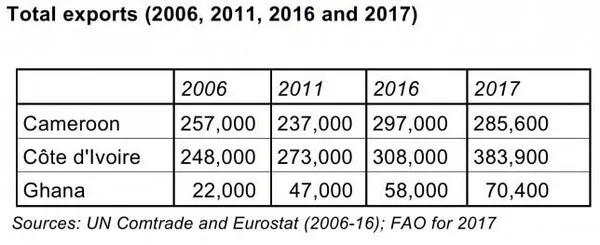Strong and influential trade unions are the foundation for true social justice in the world of work, as much in Africa as in any other continent on the planet.
Banana Link’s Policy & Communications Officer, Paul Lievens, takes a look at a recent report published jointly by Banana Link and the International Union of Foodworkers (IUF) which examines the situation of workers employed in banana export production in Africa, and why a united voice is necessary to address the challenges faced on plantations.
The banana sector in Africa
Latin America continues to dominate international trade with six of the seven main exporting countries supplying 80% of the global market. The top exporting African country is Côte d’Ivoire, currently in eighth place in global rankings, whilst Cameroon is tenth and Ghana fourteenth.

The banana export sector in Africa has been expanding over the last decade. It is characterised by a number of key elements, including:
- companies that operate on an industrial scale and are recruiting workers;
- the investment of significant sums of money;
- the creation of direct and indirect jobs;
- industrial production that operates almost exclusively in a monocultural system with production geared towards exports;
a ‘hidden’ presence of small producers who are not well organised or structured; - a small percentage of the total volume of production is earmarked for local or sub-regional consumption
- salaries that constitute income for several tens of thousands of employees.
However, decent working conditions and good industrial relations are lacking in some parts of the industry. In the francophone countries there is obsolete national legislation that no longer reflects the reality of the working environment, while some companies take advantage of completely outdated minimum wage levels to minimise labour costs and maximise profits.
Moreover, the current level of worker representation, social dialogue and collective bargaining is unable to meet the needs of workers. Many find themselves grouped into micro-organisations, resulting from the fragmentation and proliferation of trade unions, with low capacity, leading to unequal power relations and unfavourable outcomes for workers and their causes. The specific rights of women workers are still not recognised or respected in many cases.
Meanwhile, in some companies, human rights in the workplace are not respected at all, with workers unable to organise into unions for fear of being sacked or of other forms of retaliation.
The state of African trade unions
Ten years ago, banana workers’ unions in Africa were unaware of each other’s existence. Workers themselves had even less awareness of the various trade unions representing those employed in the banana sector. National borders and language barriers between countries, and language barriers within Cameroon, meant workers had little contact with each other. And this was despite the fact that more than half of African workers were employed by the same company.
This proliferation of trade union organisations, with their divergent ideological and political affiliations, their competing leaderships and, above all, the dubious credentials of some of the people in charge, has not led to the sort of unified, effective and results-oriented trade union action that could meet workers’ expectations.
To address this, the IUF and Banana Link have supported the creation of trade union platforms as an umbrella structure in a given company. These unitary platforms have become the sole vehicle for conducting dialogue between workers’ representatives and management.
For the full press release, please click here.
